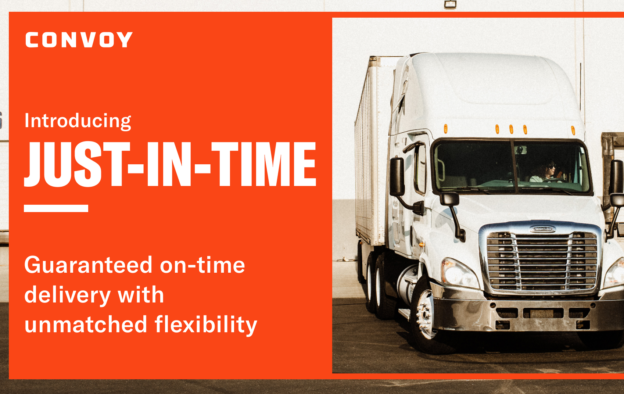Introducing Guaranteed Primary
Convoy News, Shippers • Published on September 17, 2020
Today I am excited to introduce Convoy Guaranteed Primary, a new, industry-first pricing program for primary freight RFPs that reduces a shipper’s total cost by up to 19% while guaranteeing capacity. Guaranteed Primary eliminates the win-lose dynamic of traditional RFPs. It provides shippers with a fixed margin that can be up to 50% lower than the industry average. It offers 100% tender acceptance, eliminating thousands of hours wasted each year sourcing capacity when tenders are rejected. And it provides unparalleled transparency into truck costs and total savings realized through the program.
Contract Freight for Shippers and Carriers Can Be a Win-Win
Customers across all major vertical industries are turning to Guaranteed Primary to secure high-quality capacity, reduce overhead costs from managing requests for proposals (RFPs), and avoid the cost and service quality risk of the spot market.
I wanted to share a little more about the challenges of today’s freight RFP process, and why we think Guaranteed Primary will be a game-changer for shippers and carriers alike.
Trucking’s Paper Rates vs. True Contract Rates
It’s no secret annual bids rarely work out as planned. In reality, the freight market is volatile, with booms and busts independent from the rest of the economy, making it very hard to predict. In fact, the freight industry experiences a major swing roughly every three to four years—twice as often as the overall economy.
So, this volatility—this unpredictability—is not new. The challenges of running and executing an annual RFP and the resulting contract are well-known by shippers, brokers, and carriers. What’s less understood, however, is the premium that shippers pay for these non-binding contracts, and how little budget stability and cost savings they actually provide.
Said another way, traditional contract rates are a myth; the true cost a shipper pays is 3-21% higher per mile[1] than their paper contract rate.
Let’s look at why that is.
First, contracts take nearly as much time to plan as they do to break. For a shipper moving 225,000 loads a year, an average RFP takes four months to execute, in the end costing $2.5 million to administer. According to industry experts, those contracts are typically broken within six months, due to changes in the freight cycle that weren’t predicted during the planning process.
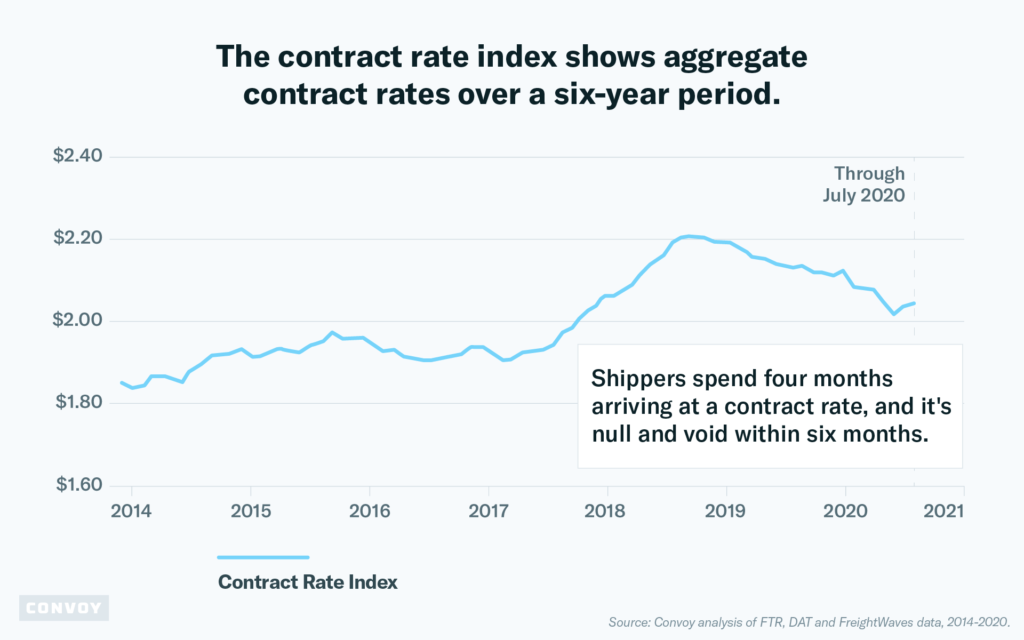
Next, when contracts break, routing guides fail, sending shippers down the backup tree, and eventually to the spot market. In an RFP, carriers are motivated to bid low in order to win business; however, when the market tightens and truck prices increase, they often decline the freight they earlier agreed to take. Shippers then have no choice but to re-negotiate contracts, move to more expensive backup carriers, or shift into the high-priced spot market. This all adds costs to the RFP’s paper rates.
The graph below shows a shipper’s true spend per mile when factoring in both the RFP’s overhead, plus additional backup and spot costs following contract breaches. Suddenly, the contract’s rate has increased 3-21% higher, per mile. This hidden cost is typically not accounted for in the company’s transportation budget line.
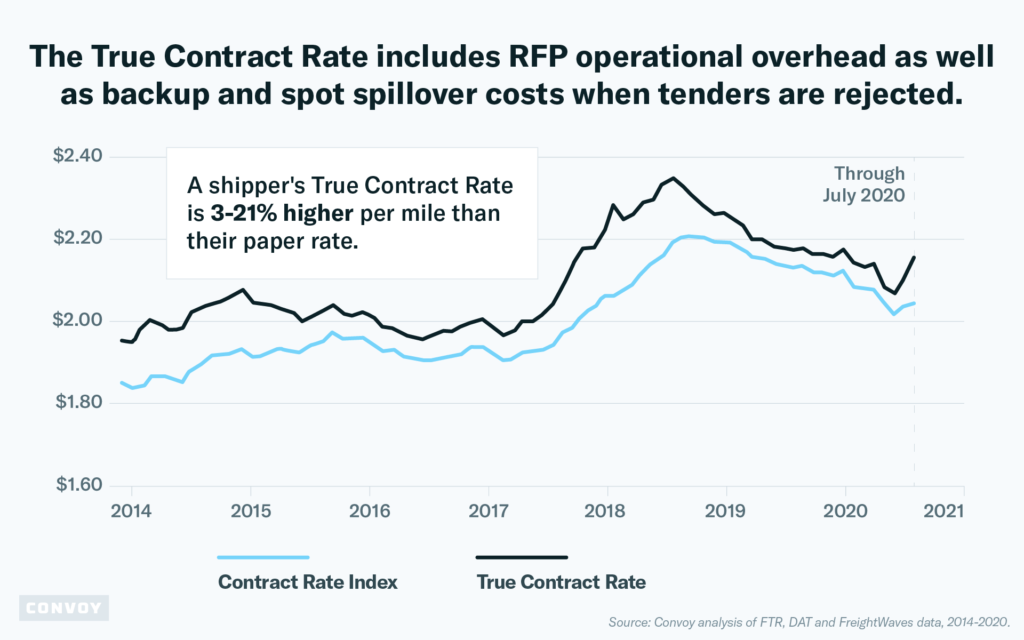
Shippers face additional hidden costs and quality risk when their primary freight moves to the spot market, using unknown carriers who may not have the same service quality as those who haul familiar lanes under contract. This can sometimes result in delayed shipments, missed appointments, or worse, accidents and cargo claims.
As a result, a shipper’s True Contract Rate is actually at or above the spot market rate. To get a sense of a shipper’s True Contract Rate, you take their all-in spend (their paper rate, plus costs stemming from an RFP’s overhead and freight spillover into spot) and compare it to the spot market. You’ll then see that in tight markets, the True Contract Rate is roughly equal to the spot market. In soft markets, it’s substantially worse—around 11% higher than spot, shown in the graph below. In this case, shippers have a decision to make: either overpay, or opt to break contracts and risk quality of service to source capacity through the spot boards and take on hidden costs in the form of operational hours spent sourcing those loads.
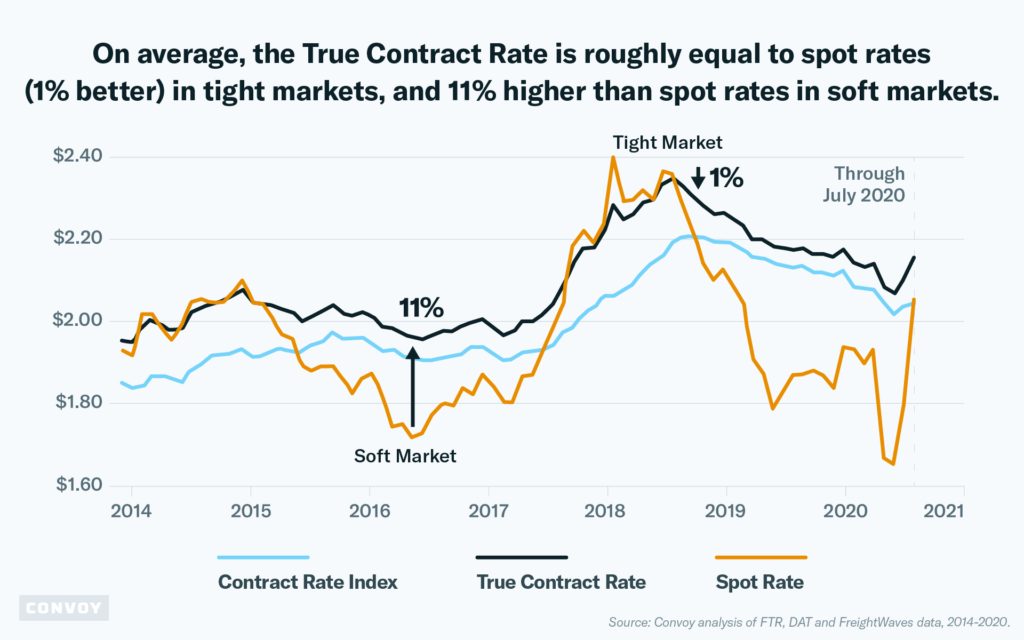
RFPs present a zero-sum game with either winners or losers between shippers and carriers, with practically no way of predicting who will end up on top. In the end, everyone feels terrible, no matter the scenario.
We’ve been working with select customers since 2019 on a better approach—one that promises capacity in any market, on any lane, all while reducing costs, and ensuring carriers aren’t left behind.
Introducing 100% Tender Acceptance with Convoy Guaranteed Primary
And that’s what we’re excited to announce today: a new approach to getting out of the RFP’s win-lose cycle. We call it Convoy Guaranteed Primary.
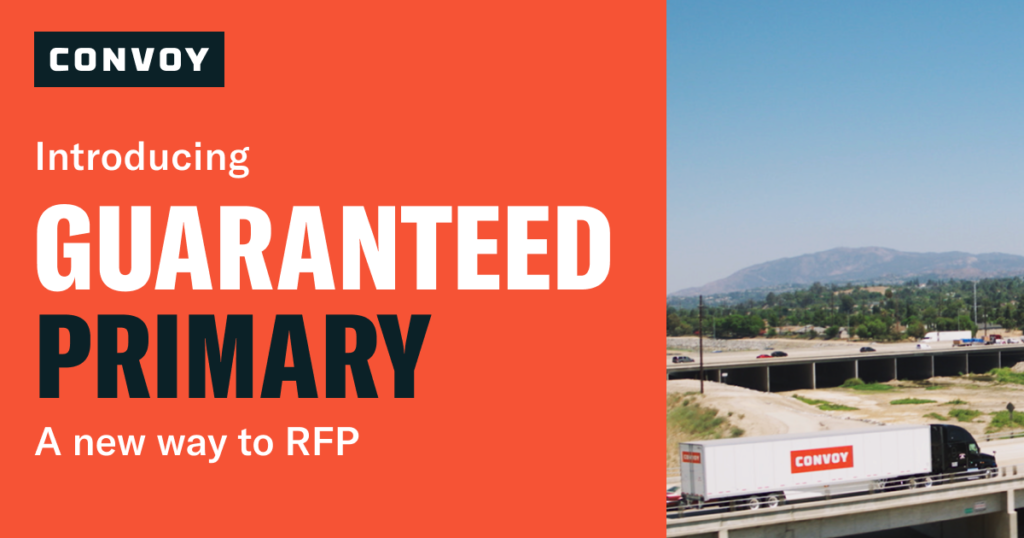
Guaranteed Primary is a new way to RFP, offering shippers a fixed margin that can be 50% lower than the industry average, with 100% tender acceptance. This program can reduce a shipper’s transportation costs by up to 19%, increase quality by never having to go to the spot market, and save valuable employee resources spent procuring capacity as a result of failed routing guides.
As a digital freight network that serves both sides of the market, Convoy is in a unique position to offer a contract program that predicts prices and guarantees capacity for shippers, while also helping carriers be more profitable. Guaranteed Primary is a win-win program that breaks the painful up-and-down cycle of an RFP’s long-term contracts.
Creating the Win-Win for Shippers and Carriers
Here’s how Guaranteed Primary works.
When a shipper uses Guaranteed Primary, they completely eliminate the need for an RFP or mini-bid. To start, they allocate all volume on any lane to Convoy. In contrast to an RFP contract’s fixed per-mile rate, Guaranteed Primary establishes a fixed margin that shippers pay (up to 50% lower than the industry average of 15-18%). Guaranteed Primary customers pay dynamic prices generated by Convoy’s pricing algorithm, which uses machine learning on historical and real-time data to predict truck costs on the awarded lanes, when the shipper is ready to tender, typically a few days out.
As the shipper tenders loads to Convoy, we guarantee acceptance by tapping into our nationwide network of hundreds of thousands of trucks. Through automated bidding, carriers compete to haul loads, ensuring our customers always get quality capacity at the lowest available rates.
Convoy provides full transparency on truck costs and margin for every shipment. Each month, customers receive an insights report detailing their estimated savings, comparing their actual costs to what they would have spent using an RFP or the spot market. Customers can cancel anytime, for any reason.
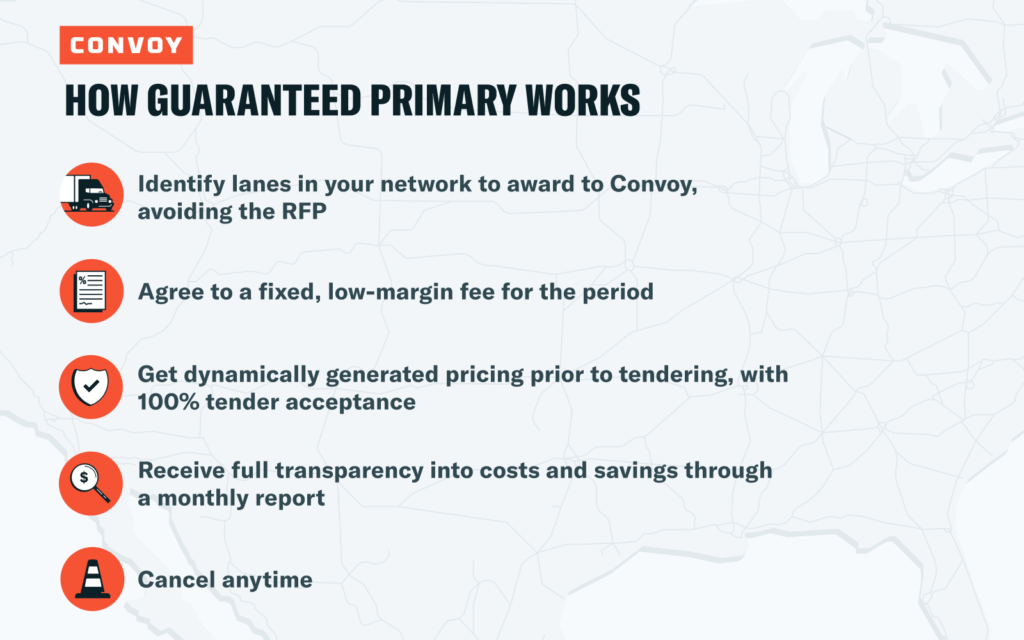
Lowering Total Cost with Guaranteed Capacity and Complete Transparency
Over the last year, we’ve been piloting Guaranteed Primary with shippers in every major vertical industry. To date, these customers have seen annual reductions in their overall transportation spend while enjoying 100% tender acceptance.
With Guaranteed Primary, a shipper that runs 10,000 loads through an RFP contract could save nearly $1 million annually, or 19% of their total transportation spend. A shipper moving 225,000 loads could save $5 million annually, or 5% of their transportation spend. And finally, a shipper with approximately one million annual loads could save $17 million annually, representing 4% of their transportation spend.
Guaranteed Primary also offers 100% tender acceptance. We achieve this by having access to a massive nationwide network of hundreds of thousands of trucks, and by using machine learning to accurately price loads and predict capacity at the time and location of pickup.
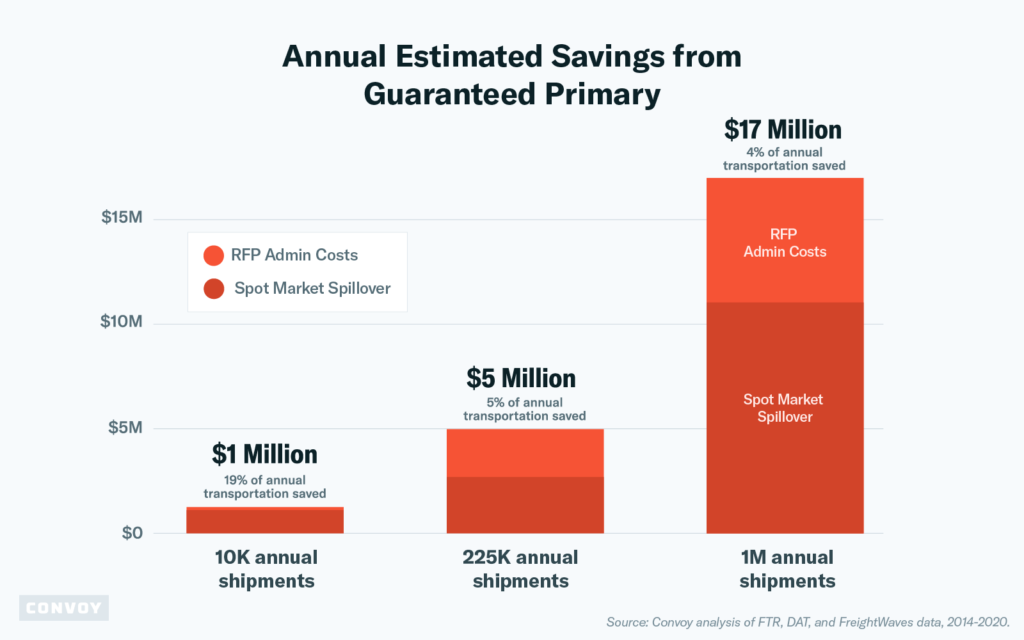
Transparency to Build Trust
When shippers use Guaranteed Primary, they’re making a bet that Convoy can reduce their transportation costs while knowingly riding the highs and lows of the freight market. This can be a daunting proposition based on how different the model is compared to traditional RFPs and contracts.
To address this concern, and to ensure that Convoy is continually working to cost-effectively source capacity, we provide an unmatched level of transparency. Prior to starting Guaranteed Primary on any lane, we’ll forecast a shipper’s savings in advance, and share this information to help with budgeting. Then, on a monthly basis, we’ll track progress toward this goal. We will provide detailed analytics on our customers’ operational and line haul savings, and our actual truck costs with granularity into individual lanes by day of the month. As part of this, we show daily truck cost ranges by lane and how cost-effectively we sourced trucks on that day. For example, in some cases, we may not source the least expensive truck based on our confidence in the driver’s ability to make an on-time pickup.
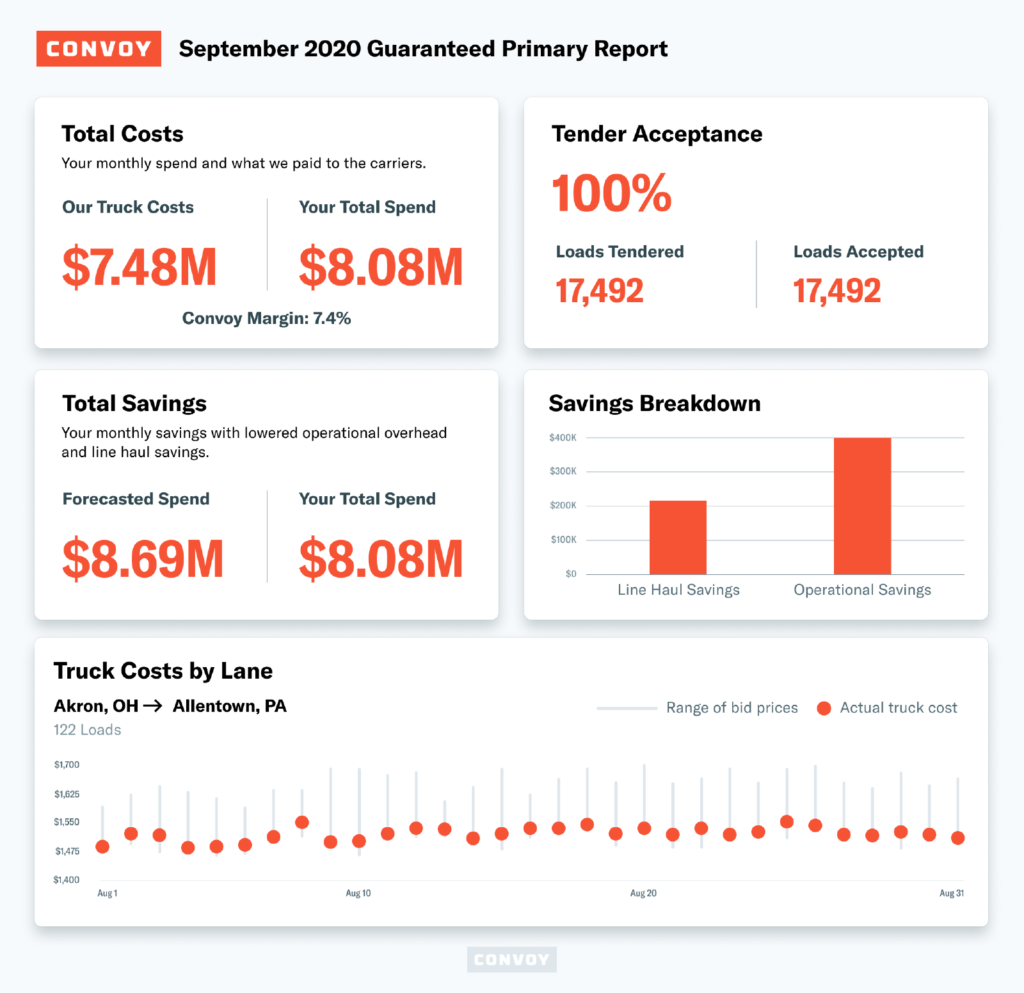
Try Guaranteed Primary Today
Convoy Guaranteed Primary is available to shippers of all sizes, across the nation, starting today. Interested in giving it a try? Learn more about guaranteed tender acceptance program or drop us a line at sd@convoy.com.
More on Guaranteed Primary
For more resources on Guaranteed Primary, check out our white paper or our webinar, which covers how to adapt to the freight market softening with dynamic pricing.
[1] Terrazas, Aaron. “Contract Freight’s Paper Curtain.” Medium. 9/17/2020.


